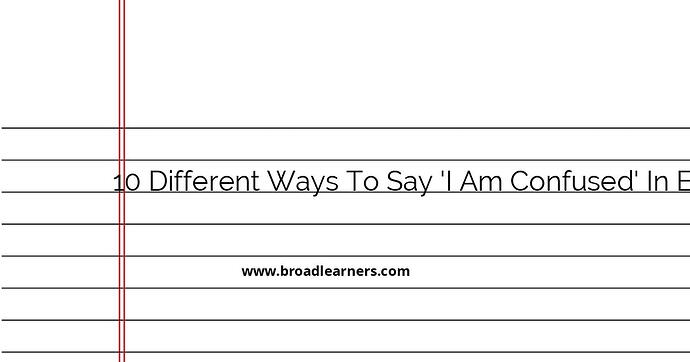Feeling confused is a common experience, and there are many ways to express this in English. Here are 10 different ways to say 'I am confused' that you can use in various situations:
- I'm at a loss
- I'm puzzled
- I'm bewildered
- I'm unsure
- I'm uncertain
- I'm baffled
- I'm perplexed
- I'm disoriented
- I'm muddled
- I'm mixed up
Let's take a closer look at each of these alternatives:
1. I'm at a loss
This phrase indicates a state of confusion where you don't know what to do or how to proceed. It suggests a feeling of being completely unsure or unable to find a solution.
Example:
I'm at a loss as to how to solve this math problem. Can you help me?
2. I'm puzzled
When you are puzzled, you are confused and trying to understand or figure out something that doesn't make sense to you.
Example:
I'm puzzled by the instructions for assembling this furniture. They don't seem to match the parts.
3. I'm bewildered
Being bewildered means you are extremely confused and unable to make sense of a situation or information.
Example:
I'm bewildered by the sudden change in the project requirements. I thought we had everything planned out.
4. I'm unsure
When you are unsure, you lack confidence or certainty about something. You feel uncertain or hesitant.
Example:
I'm unsure about which option to choose. They all seem equally good.
5. I'm uncertain
Similar to being unsure, being uncertain means you have doubts or a lack of confidence in your understanding or decision-making.
Example:
I'm uncertain about the outcome of this experiment. There are too many variables to consider.
6. I'm baffled
When you are baffled, you are completely puzzled or confused, often by something that is unexpected or difficult to understand.
Example:
I'm baffled by the sudden disappearance of my keys. I had them just a moment ago.
7. I'm perplexed
Perplexed means you are confused or puzzled by something that is complex or difficult to understand.
Example:
I'm perplexed by the professor's explanation. I'm not sure I fully grasp the concept.
8. I'm disoriented
Being disoriented means you feel lost or confused about your location or situation. You may feel a sense of being off balance or not knowing which way to go.
Example:
I'm disoriented in this new city. I can't figure out how to get to my hotel.
9. I'm muddled
When you are muddled, your thoughts or understanding are unclear or confused.
Example:
I'm muddled about the instructions for this recipe. It's not clear what steps to follow.
10. I'm mixed up
If you are mixed up, you are confused or mistaken about something. You may have misunderstood or misinterpreted information.
Example:
I'm mixed up about the dates for the event. Can you clarify when it's happening?
These alternative phrases can help you convey your confusion in different contexts. Use them when appropriate to express your lack of understanding or uncertainty effectively.
Did I miss anything? Respond below
